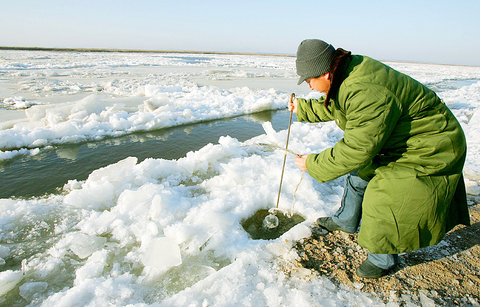Five more Chinese cities prepared to stop drawing water from the benzene-laden Songhua River yesterday, as the country's top work safety official warned of long-term dangers from the toxin.
In Russia, residents stocked up on bottled water and an official warned that a lack of running water could threaten heat supplies in the dead of winter, as the spill of benzene into the river from a Nov. 13 chemical plant explosion slowly moved toward the border.
Beijing has sought to ease strains with Moscow, a key diplomatic partner and source of much-needed oil, promising to send filtering materials to help reduce the impact from the spill.

PHOTO: AP
Li Yizhong, minister of China's State Administration of Work Safety, said measures taken so far to protect the millions living along the river were only a "partial victory," the local Communist Party newspaper Harbin Daily reported yesterday.
Li, visiting the city of Jiamusi, where the pollution is expected to arrive in the next few days, warned that the slick was getting longer as it flowed downstream through the iced-over Songhua, affecting an ever growing area.
There was no obvious drop in the concentration of pollutants, up to 21 times the allowable standard, the newspaper quoted Li and other officials as saying.
"Cities on the Songhua River need to stay at a high level of alert," Li said.
On Thursday, China's Foreign Ministry announced it was sending to Russia pollution monitoring devices and 150 tons of activated charcoal to help filter drinking water. Beijing also offered to send experts to help install it.
The disaster has prompted a massive relief effort at home by China's communist government, which is trying to repair its image after complaints that officials concealed the spill and lied to the public.
Officials have sent millions of bottles of drinking water and fleets of water trucks to communities on the Songhua that have cut off running water as the benzene passed. The biggest was the industrial center of Harbin, where 3.8 million people went without water last week.
Downstream, Dalianhe shut down running water to 26,000 residents on Wednesday.
The cities of Jiamusi, Tangyuan, Huachuan, Fujin and Tongjiang were preparing to stop drawing river water as the slick approached, according to provincial and local officials.
It wasn't immediately clear how many people would be affected or whether those communities could draw on wells or other sources to continue supplying running water.
On Thursday, residents of Dalianhe lined up with jugs and buckets to get drinking water delivered by fire trucks after the government shut down drinking water to its 26,000 people.

Indonesia yesterday began enforcing its newly ratified penal code, replacing a Dutch-era criminal law that had governed the country for more than 80 years and marking a major shift in its legal landscape. Since proclaiming independence in 1945, the Southeast Asian country had continued to operate under a colonial framework widely criticized as outdated and misaligned with Indonesia’s social values. Efforts to revise the code stalled for decades as lawmakers debated how to balance human rights, religious norms and local traditions in the world’s most populous Muslim-majority nation. The 345-page Indonesian Penal Code, known as the KUHP, was passed in 2022. It

US President Donald Trump on Friday said Washington was “locked and loaded” to respond if Iran killed protesters, prompting Tehran to warn that intervention would destabilize the region. Protesters and security forces on Thursday clashed in several Iranian cities, with six people reported killed, the first deaths since the unrest escalated. Shopkeepers in Tehran on Sunday last week went on strike over high prices and economic stagnation, actions that have since spread into a protest movement that has swept into other parts of the country. If Iran “violently kills peaceful protesters, which is their custom, the United States of America will come to

‘DISRESPECTFUL’: Katie Miller, the wife of Trump’s most influential adviser, drew ire by posting an image of Greenland in the colors of the US flag, captioning it ‘SOON’ US President Donald Trump on Sunday doubled down on his claim that Greenland should become part of the US, despite calls by the Danish prime minister to stop “threatening” the territory. Washington’s military intervention in Venezuela has reignited fears for Greenland, which Trump has repeatedly said he wants to annex, given its strategic location in the arctic. While aboard Air Force One en route to Washington, Trump reiterated the goal. “We need Greenland from the standpoint of national security, and Denmark is not going to be able to do it,” he said in response to a reporter’s question. “We’ll worry about Greenland in

Auschwitz survivor Eva Schloss, the stepsister of teenage diarist Anne Frank and a tireless educator about the horrors of the Holocaust, has died. She was 96. The Anne Frank Trust UK, of which Schloss was honorary president, said she died on Saturday in London, where she lived. Britain’s King Charles III said he was “privileged and proud” to have known Schloss, who cofounded the charitable trust to help young people challenge prejudice. “The horrors that she endured as a young woman are impossible to comprehend and yet she devoted the rest of her life to overcoming hatred and prejudice, promoting kindness, courage, understanding